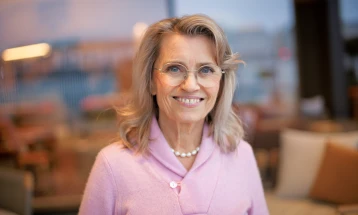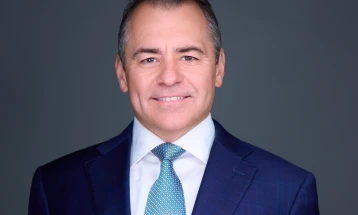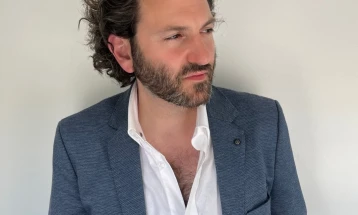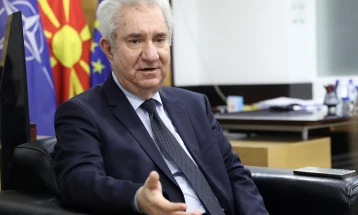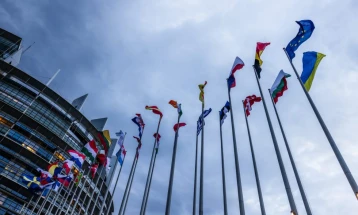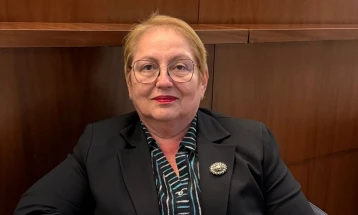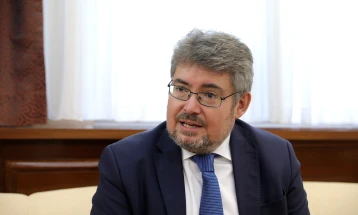Potential for economic cooperation still untapped, lots of opportunities available, Amirbayov tells MIA
- Potential for economic cooperation between Azerbaijan and North Macedonia is still very much untapped, we have lots of opportunities, and we should have more contacts between not only officials but also the business circles, different sorts of business fora, different delegations of line ministries. We need a regular channel of communication in terms of business and trade opportunities, says Elchin Amirbayov, Special Envoy of the President of Republic of Azerbaijan, in an interview with MIA.
- Post By Ivan Kolekevski
- 10:46, 11 June, 2023

Skopje, 11 June 2023 (MIA) - Potential for economic cooperation between Azerbaijan and North Macedonia is still very much untapped, we have lots of opportunities, and we should have more contacts between not only officials but also the business circles, different sorts of business fora, different delegations of line ministries. We need a regular channel of communication in terms of business and trade opportunities, says Elchin Amirbayov, Special Envoy of the President of Republic of Azerbaijan, in an interview with MIA.
Amirbayov says lack of knowledge about each other’s economic opportunities is one of the main reasons for the low trade exchange between the two countries.

On the possibility of North Macedonia getting natural gas from Azerbaijan, the Special Envoy says this is not a question for Azerbaijan because the problem lies in the lack of necessary transmission capacity or the distribution networks, and basically the lack of infrastructure.
Mr.Elchin, you act as a special envoy from the presidential administration, what is the purpose of your visit to Macedonia?
- Well, there are two purposes, first of all, of course, it is to go through our bilateral relations with the Macedonian authorities because as you know, in two years’ time we will celebrate 30 years since the establishment of diplomatic relations, so it is a good time to take stock of what we’ve achieved and what we can do better. And the second reason is to brief our Macedonian colleagues on the current situation in terms of regional security in the region that I represent, South Caucasus, more concretely about the ongoing peace process between Azerbaijan and Armenia, taking into account that North Macedonia is this year exercising the role of Chairman-in-Office of the OSCE, to which Azerbaijan is also a member state. So these are two main issues to raise.
As you mentioned, on 28th of this month, we celebrate 28 years of diplomatic relations. In your opinion, where are we now and how can we advance?
- Well, I should tell that in terms of political dialogue we have very good relations, leaders and ministers see each other on a regular basis, especially foreign ministers recently met several times. Your foreign minister traveled to Azerbaijan in April of this year, it’s true that he did it in his capacity as Chairman-in-Office of OSCE but he also could exchange with Azerbaijani counterparts on bilateral issues, so we believe that the potential for economic cooperation between our two countries is still very much untapped. So, we have good potential, we have lots of opportunities, so that’s why I believe that we should have more contacts between not only officials but also the business circles, different sorts of business fora, different delegations of line ministries could be interesting. Unfortunately, we don’t have yet an intergovernmental economic commission which is normally a mechanism which on a regular basis looks into bilateral economic relations and trade relations. That’s why the trade turnover figures are quite modest. They are almost non-existent. So that’s why I think that is the area where we have to concentrate more.
I did some research, according to the Macedonian State Statistical Office, the goods exchange with Azerbaijan in the last year was slightly above half million euros of export and EUR 150.000 of import. According to you, what are the potential areas for better economic activities between the two countries?
- Well, Azerbaijan is known traditionally as an energy supplying country. So, we are one of the main strategic partners of the European Union in terms of contributing to energy security of the EU. We know that North Macedonia is a candidate country, you started, I think last year, your accession talks, and lots of countries in Southeastern Europe are in touch with Azerbaijan now in order to agree on some deliveries of natural gas, but energy is only one field, and I think what we need to do is concentrate what are the main goods that each country can propose to each other. We should have a regular channel of communication in terms of business and trade opportunities. That is why I believe a lot of work is still ahead, and Azerbaijan has recently accredited a new ambassador to North Macedonia, our ambassador in Serbia is now also ambassador in Skopje. Unfortunately, we don’t yet have any representative from North Macedonia who is accredited today in Azerbaijan, but I think that the contacts that we already had recently can provide us with an opportunity to fill in these gaps and I think one of the main reasons of these low figures is lack of knowledge about each other’s economic opportunities, so I look forward to seeing quite a different picture very soon.

Any local regional projects that could be implemented?
- As I said, Azerbaijan has successfully completed at the end of 2020 the huge project which is called Southern Gas Corridor which basically transmits the natural gas resources of Azerbaijan from our sector of the Caspian Sea, through six countries, to Italy and to a number of other nations, so soon the number of countries – recipients of naturals gas from Azerbaijan will reach 10. So I think there is certain interest which was expressed by North Macedonia also to import some of Azerbaijani natural gas, so this is the low-hanging fruit as they say, but besides that I think that Azerbaijan could be an attractive market also for some of the Macedonian goods and vice versa.
When we are on the gas topic, Azerbaijan is the land of fire, that’s your country motto. Unfortunately, the Azerbaijani gas through the TAP and TANAP gas pipelines is available in the neighborhood but not in North Macedonia. As we mentioned, in 2018 or 2019 there was some announcement that we would try to connect with the interconnector in Alexandropoulos in Greece, but when will we have the Azerbaijani gas in Macedonia?
- Well, I don’t think the question should be posed to Azerbaijan because as a supplier of gas we would be happy to deliver natural gas also to North Macedonia, but the problem is in the lack of necessary transmission capacity or the distribution networks, so basically the infrastructure itself is lacking. It was also the case with your neighbor Albania. The construction of distribution networks which would not only allow you to receive our gas but also to deliver it to households, that is normally the responsibility of the receiving state. So, I think that this could also be a subject of North Macedonia’s discussions with the European Union because the EU is very much supporting the Southern Gas Corridor, but on our side we are open and ready to include North Macedonia into the list of recipient countries.
Hypothetically, we are now paying the priciest gas in the region, so if we have Azerbaijan gas how would that affect the prices?
- Normally, the more sources of gas you have, the more competitive our price is and lower for those who are consumers, so I think that's a market law and if you have additional source of gas, that may positivity affect prices for your consumers.
Mr. Elchin, you've served at Azerbaijan's Permanent Mission in the UN, our countries are also a part of the European Political Community, and last month you had a second meeting in Chisinau, Moldova. In your opinion, what is the potential of this initiative?
- As you know, this initiative was launched relatively recently by France, and ever since we had only two summit meetings. As any new initiative, I think it needs some time so that it settles down and people really understand what comparative advantage this platform can provide to member states, compared to all the rest of organizations and platforms that already exist. But from what I can tell from a personal point of view, it was a good gathering of leaders, more than 45 nations were represented. The strictly informal nature of discussion and exchanges added some more value into the quality of the discussions. But this is still in a way a good opportunity for leaders to see each other on a regular basis, and as I understand meetings will take place twice a year, for them to take up all the issues they can consider of pertinence to current situations in international relations. That is why we don't see any concrete results now but it is a fact that that this gathering may be used by nations to have discussions on many other issues, in smaller groups, which is also a good opportunity.

Efforts for reaching a peace agreement between Azerbaijan and Armenia over Nagorno-Karabakh are intensifying. From Armenia’s side, there was an announcement that there was a possibility by the end of this year to have some sustainable solutions to the problem. In your opinion, is there a possibility for this?
- Before responding to this question I think one has to understand that real opportunities or chances for peace emerged after the end of the Second Karabakh War, when Azerbaijan during 44 days was able to liberate territories which had been under illegal Armenian occupation for almost 30 years. So, after having restored historical justice and territorial integrity, Azerbaijan proposed to Armenia a post-conflict peace agenda. That's why we put on the table the draft peace treaty, which could help us turn this page of hostility and try to normalize our relations. This treaty is based on reciprocal respect of each other's territorial integrity, sovereignty, and inviolability of internationally recognized borders, and rejection of any territorial claims to each other now and in the future. Therefore, we do believe that if Armenia proves by real acts, not only by declarations, that they are ready for peace, that they abandon territorial claims to Azerbaijan, if we can see genuine proof for that on the ground, then we have a big chance to have this peace. It's difficult for me to give any timelines because sometimes when they are not met it creates some frustrations, but we have to see how genuine the Armenian side is, because on one hand Armenia's PM talks about his respect to territorial integrity of Azerbaijan, and on the other side there are 10,000 regular Armenian units of armed forces in the sovereign territory of Azerbaijan, in Karabakh region. You mentioned Nagorno-Karabakh, it used to be the case because it was a creation of Stalin at the time. Nagorno in English means mountainous, because there were two parts of historic Azerbaijani province of Karabakh, the lowlands and highlands. Today we have a new territorial administrative division of our territory. I will leave you this map so you can see one single Karabakh economic region, which unites both mountainous and lowlands parts of Karabakh. This region will also be multiethnic because when we have the big return of hundreds and thousands of internally displaced persons of Azerbaijani origin who have been subjected to ethnic cleansing by Armenia, we will have a region with a population of several hundred thousand and hopefully Armenians will also be a part of this. That's what we actually propose to local Armenians, to engage with central authorizes of Azerbaijan in discussions and negotiations, in order to agree on the conditions of their reintegration into the social, economic, humanitarian and political framework of Azerbaijani state, in accordance with our Constitution. But, going back to the peace treaty between Armenia and Azerbaijan, because this an internal issue of Azerbaijan and discussions with local Armenian citizens, and peace negotiations have intensified recently. Since early May, we've had several rounds of discussion at the level of foreign ministers and leaders and we hope that we'll soon continue the discussions. A peace treaty is within reach, but as they say it takes two to tango, so we expect Armenia to behave responsibly and deliver on the promises that they make, and that they implement the commitments they have undertaken, including a withdrawal off all their armed forces from the sovereign territory of Azerbaijan, because you cannot talk about peace and at the same time keep this illegal military presence in our territory which is a direct threat to security and stability, and any prospects for peace. We want this problem to be addressed so that we can concentrate on peace negotiations in a much better environment.
The war in 2020 ended with a ceasefire agreement, signed with the participation of Russia. Considering the war in Ukraine, there is a shift in Brussels and a meeting next month related to other points, such as civil rights?
- This is a very complex issue that requires clarity and we should not mix different subjects. When we talk about Armenia-Azerbaijan negotiations, they are held in different places and have different facilitators. Russia is one of those because they are one of the signatory-parties to the ceasefire agreement and they also host meetings regularly, the most recent being in May, when Moscow hosted foreign ministers and leaders. Then we have Brussels, which is a trilateral facilitation process, held by the European Council President Charles Michel with President of Azerbaijan Ilham Aliyev and Armenian Prime Minister Nikol Pashinyan. Then we also have the United States, which tries to bring more energy into this process, and the Americans were the ones who restored this negotiations process after a long pause, a the result of the obstruction by Armenia, which wanted to escape the negotiations with Azerbaijan. But finally they understood there is no other way to achieve sustainable peace than to talk to Azerbaijan. So it doesn’t matter what is the name of the city where we talk, because at the end of the day, it is a bilateral Armenia-Azerbaijan negotiation in order to agree on the text of the peace agreement. This text will enumerate the major principles upon which the relations between two nations will be based, it will also allow to open the transportation links that were blocked and it will also allow us to delimitate the border, which has not been delimitated until now. These are the three major clusters on which we talk with Armenia. On the rights of national minorities, the Armenian national minority in Azerbaijan currently living in the Karabakh region, but we should also not forget about the Azerbaijani ethnic minority in Armenia. Before the start of this conflict, Armenia hosted 250,000 ethnic Azerbaijanis but unfortunately these people were subjected to ethnic cleansing and were expelled from this territory. Today, when we talk about long-term peace and rights of minorities, we also raise the issue of rights of hundreds of thousands of Azerbaijanis, who have the right to go back to their historic homeland. So we are discussing the rights of Armenians in the Karabakh region, and this is a dialogue between the central authorities of Azerbaijan and local Armenians, so Armenia is out of this picture. On this front, I think Azerbaijan is ready to engage with its citizens of ethnic Armenian origin but we expect them to be constructive, we expect them to understand that it is about providing them with all the opportunities to enjoy their social, economic and other rights but within the framework of the Azerbaijani state, because it should be done in line with Azerbaijani constitution.

Foreign Minister of North Macedonia and current OSCE Chairman-in-Office, Bujar Osmani, mentioned the possibility of having peace negotiations between the two countries in Ohrid. Is there any concrete proposal or invitation?
- I have not heard of any proposal from North Macedonia to host negotiations between Armenia and Azerbaijan. What I heard was a proposal by your Foreign Minister to host a meeting where all three nations from the South Caucasus – Armenia, Azerbaijan and Georgia – could participate, and the idea is to think about the ways on how to explore the opportunities for regional cooperation, for normalization of relations between the three, because Azerbaijan, right after the end of the Second Karabakh War, also was the origin of the proposal of a regional cooperation framework, which was called 3+3 – three nations of South Caucasus and three immediate neighbors – Turkiye, Russia and Iran. That proposal by Azerbaijan was positively accepted by countries in the region, but it is another issue to make sure that South Caucasus finally becomes a single political region because now it is a purely geographical region. The reason why it did not evolve into one political region is because of the occupation of Armenia of Azerbaijani territories. Now that it is over, I think that we have a good chance to explore opportunities for more robust economic and other regional cooperation between three nations. I think it is about this, but again, I am not aware of all details.
Aleksandar Atanasov
Photo: Frosina Naskovikj
Video: Srgjan Krstikj and Andrej Brankovikj
Translated by MIA English Desk
